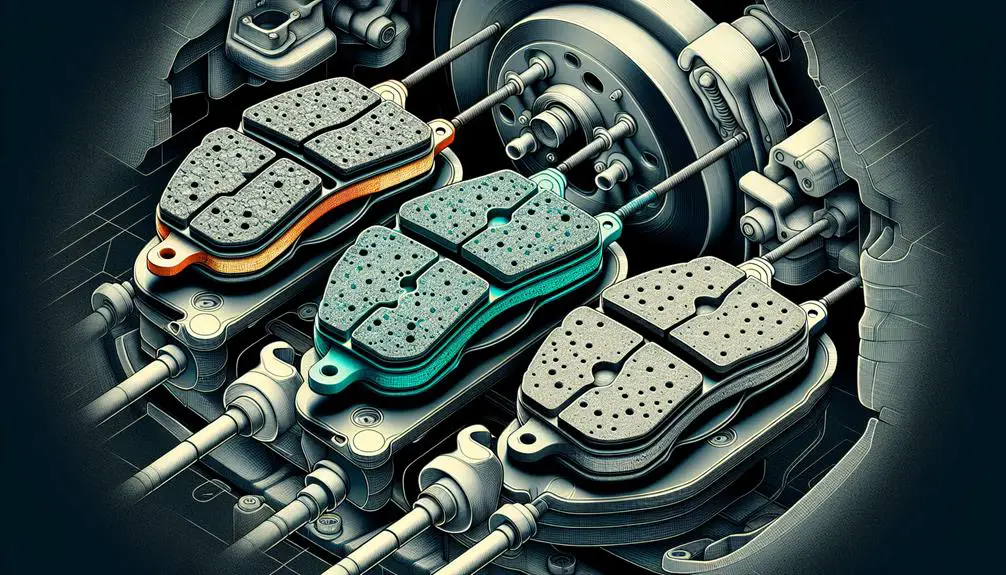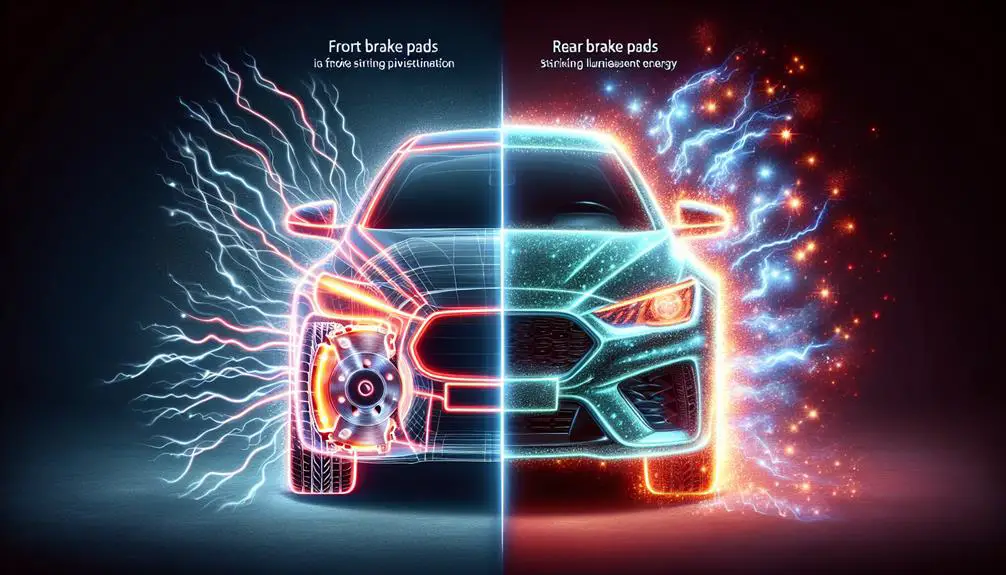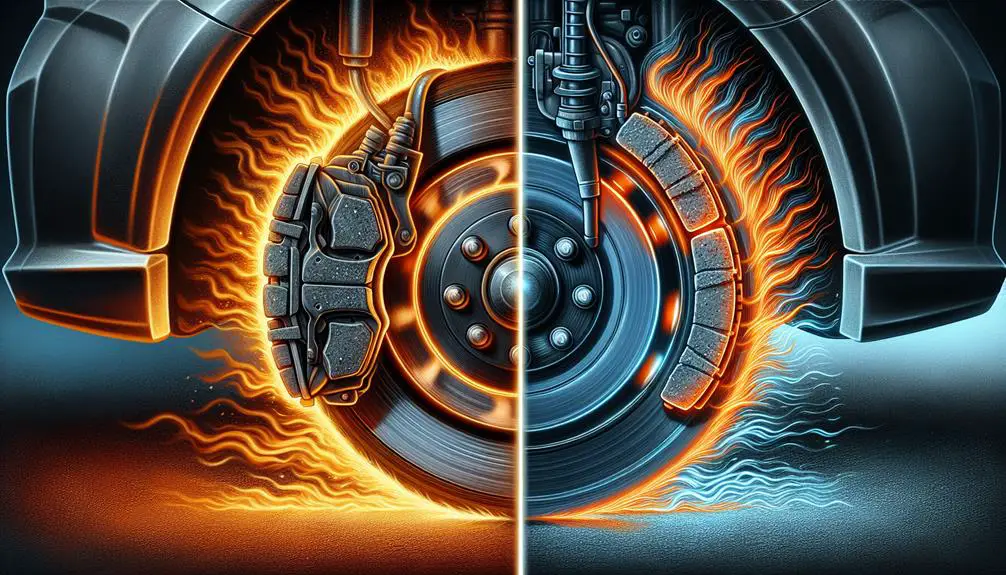The front brake pads are more important in this scenario.
Imagine you're driving down a steep hill, and you need to stop quickly to avoid a hazard. You press the brake pedal, relying heavily on your vehicle's brake pads to do their job. But have you ever wondered if the front or rear brake pads play a more critical role in this scenario?
While many drivers don't think twice about their brake pads, grasping their importance can greatly impact your safety on the road. Let's investigate the distinct roles of front and rear brake pads and why knowing the difference could be critical for your next trip.
Understanding Brake Pads

Brake pads play an vital role in your vehicle's braking system, directly impacting its safety and performance. Basically, they're the components that, when you press the brake pedal, press against the brake rotors to slow or stop your car. This means they're a critical safety feature, and grasping their function is key to maintaining your vehicle.
You mightn't think about them often, but your car's brake pads need regular attention. They wear down over time due to the friction created when you apply the brakes. How quickly they wear out depends on your driving habits, the environment you drive in, and the type of brake pads your vehicle uses. That's why it's important to know when they need replacing – typically, a squealing noise or a decrease in braking efficiency is a tell-tale sign.
There are several types of brake pads, including organic, ceramic, and metallic. Each has its advantages and is suited to different driving styles and vehicle types. For instance, ceramic pads are quieter and produce less dust but are often more expensive. On the other hand, metallic pads are durable and offer excellent performance for heavy vehicles or those that frequently drive in demanding conditions.
Choosing the right brake pads is vital for your vehicle's braking efficiency and longevity. It's not just about safety; it's moreover about optimizing your car's performance and avoiding unnecessary wear on other brake system components. Remember, your brake pads are the foundation of a reliable braking system – don't overlook their importance.
Front Brake Pads Explained
Understanding the subtleties of front brake pads is vital, as they're often the initial to wear down due to their significant role in stopping your vehicle. When you press the brake pedal, it's the front brake pads that bear the brunt of the force, slowing down your car by creating friction against the brake rotors. This is why it's important to grasp their function and significance.
Front brake pads are designed to handle high temperatures and pressures, as they're directly involved in the deceleration of your car. They're made from different materials, including ceramic, metallic, and organic compounds, each offering different benefits in terms of performance, durability, and noise level. Here's a quick overview of these materials:
| Material Type | Characteristics |
|---|---|
| Ceramic | Quiet, less dust, longer life, but more expensive |
| Metallic | High durability, better performance in extreme conditions, can be noisy |
| Organic | Softer, quieter, less expensive, wear out faster |
Choosing the right type of front brake pad depends on your driving habits and the performance you expect from your vehicle. If you're frequently driving in heavy traffic or mountainous areas, you might lean towards ceramic pads for their durability and quiet operation. Conversely, if you're after cost-effectiveness and don't mind a shorter lifespan or a bit more noise, organic pads could be the way to go.
The Role of Rear Brake Pads

While front brake pads often steal the spotlight in discussions about vehicle safety, your car's rear brake pads play an important, though less heralded, role in ensuring smooth and effective stopping. It's easy to overlook their importance, but you really shouldn't. Here's why.
First and foremost, your rear brake pads contribute to the overall balance of your car's braking system. When you hit the brake pedal, the distribution of braking force between the front and rear wheels is vital for maintaining stability. Without the proper function of the rear pads, your car might skid or spin, especially on slick or uneven surfaces. It's all about harmony; the rear pads ensure that balance is achieved, providing you with a safer driving experience.
In addition, the rear brake pads are instrumental in controlling your car during certain types of braking. Think about emergency stops or sharp, unexpected turns. In these scenarios, the rear brakes work alongside the front to reduce your vehicle's speed as quickly and safely as possible. They're like the unsung heroes, providing that extra bit of control when you need it most.
Lastly, maintaining your rear brake pads is important for the longevity of your vehicle's braking system. Neglect can lead to uneven wear, increased stopping distances, and, ultimately, a compromise in safety. Regular checks and replacements when necessary can save you from bigger issues down the line.
Comparing Front and Rear Pads
Appreciating the differences between front and rear brake pads will help you value their individual contributions to your vehicle's safety and performance. When you're behind the wheel, grasping how these components work together is vital for maintaining peak control and responsiveness during driving.
Front brake pads generally take on a heavier load compared to the rear ones. This is due to the fact that, during braking, your car's momentum shifts forward, placing more pressure on the front brakes. Consequently, they often wear out faster and require more frequent replacement. You'll notice that front pads are typically larger and made from materials designed to withstand higher levels of stress and heat.
On the flip side, rear brake pads play a supporting role but are no less significant. They help maintain stability and prevent the rear of the car from swinging out during sudden stops. While they mightn't wear out as quickly as the front pads, keeping them in good condition is crucial for balanced braking and overall vehicle safety.
It's also worth noting that the choice of brake pad material can differ between the front and rear, depending on your car's make and model, along with your driving habits. High-performance vehicles, for instance, might use more aggressive pad materials on all four wheels to match their enhanced braking needs.
Safety Implications

Comprehending the safety implications of brake pads can greatly improve your driving security. It's crucial to understand that not all brake pads are created equal, and their condition can greatly impact your vehicle's stopping power. When your brake pads are worn out or of inferior quality, they can't grip the disc or drum properly, leading to increased stopping distances. This can be particularly risky in emergency braking scenarios where every moment counts.
Here's a simple table to highlight the differences in safety features between high-quality and low-quality brake pads:
| Feature | High-Quality Brake Pads | Low-Quality Brake Pads |
|---|---|---|
| Stopping Power | Superior stopping capabilities | Reduced stopping efficiency |
| Heat Dissipation | Excellent, reducing brake fade | Poor, leading to higher risk of brake fade |
| Durability | Longer lifespan, consistent performance | Wears out faster, unpredictable performance |
| Noise and Dust | Lower levels of noise and brake dust | Higher levels of noise and dust |
| Cost-Effectiveness | More expensive initially, cost-effective long-term | Cheaper initially, more costly because of frequent replacements |
Choosing high-quality brake pads ensures that your vehicle stops more efficiently and predictably, reducing the risk of accidents. Additionally, good brake pads withstand harsh driving conditions better, maintaining their performance over time. While it might seem economical to opt for cheaper alternatives, the safety implications and potential for increased maintenance costs down the line make high-quality brake pads a smarter choice for conscientious drivers. Always prioritize your and others' safety by selecting the best possible brake pads for your vehicle.
Maintenance Tips
To make sure your brake pads continue to offer top safety and performance, it's important to stick to a regular maintenance routine. You'll want to check your brake pads' thickness periodically. If they're less than a quarter inch thick, it's time for a replacement. Don't wait for the screeching sound that indicates the pads are worn down to the metal; by then, you're not just compromising your safety but potentially causing more expensive damage to your brake rotors.
You should also listen for unusual sounds when you apply the brakes. Any grinding or squealing is a clear signal that your brake pads need attention. Keep in mind, some high-performance brake pads might make a bit of noise under normal conditions, but it's always better to err on the side of caution and get them checked.
Pay attention to how your car behaves when you brake. If you're noticing that it takes longer to stop, or if the brake pedal feels spongy or too hard, these could be signs that your brake system needs a look. It mightn't always be the pads; it could be the brake fluid or other components, but starting with the pads is a good first step.
Lastly, don't forget about the environment your vehicle operates in. If you're frequently driving in harsh conditions, like stop-and-go traffic or mountainous areas, you'll need to inspect and possibly replace your brake pads more often. Keeping up with these maintenance tips ensures you're always driving with effective brakes, offering you and your passengers the utmost safety on the road.
Conclusion
In conclusion, both front and rear brake pads play essential roles in your vehicle's safety and performance. However, front pads typically bear a heavier load during braking, making them slightly more significant.
Remember, neglecting either can compromise your safety. Keep an eye on their condition and don't skimp on maintenance. Regular checks and timely replacements guarantee your car stops effectively, keeping you and others on the road safe.
Stay proactive about your brake pads; it's a small effort for a big payoff in safety.